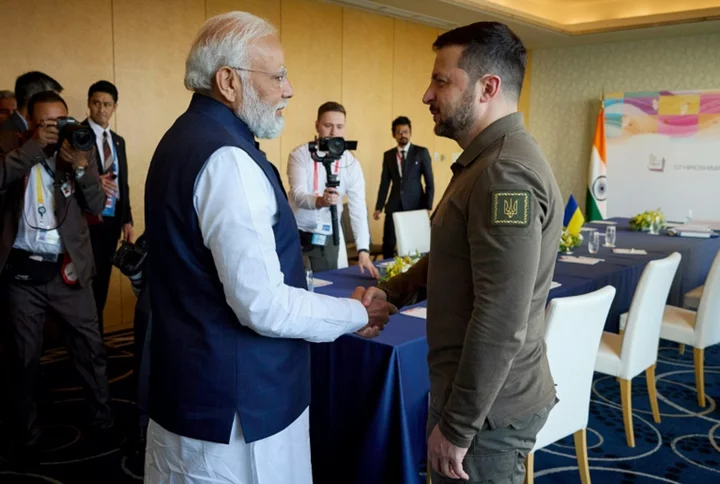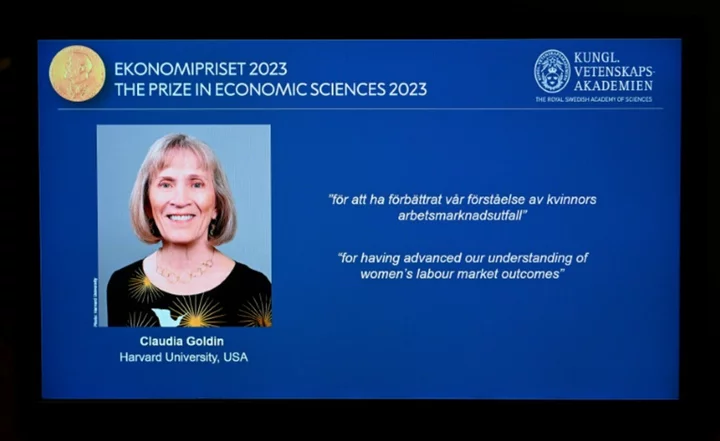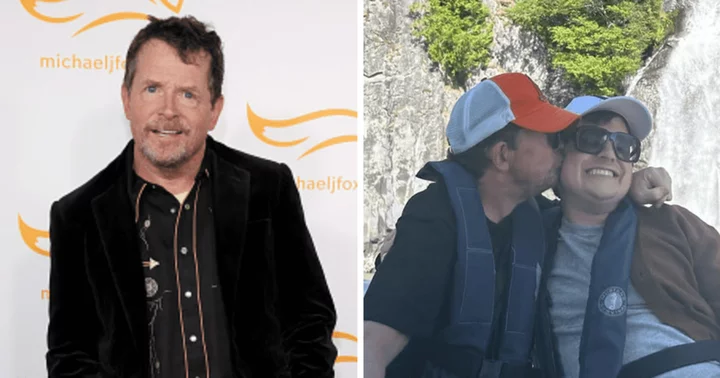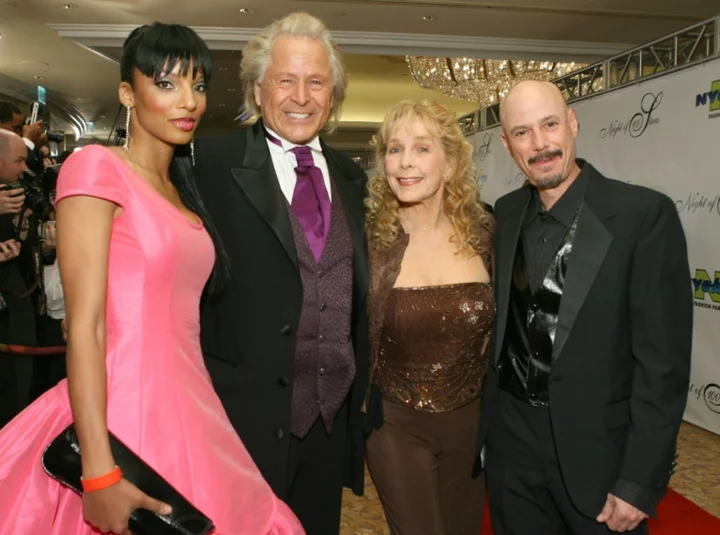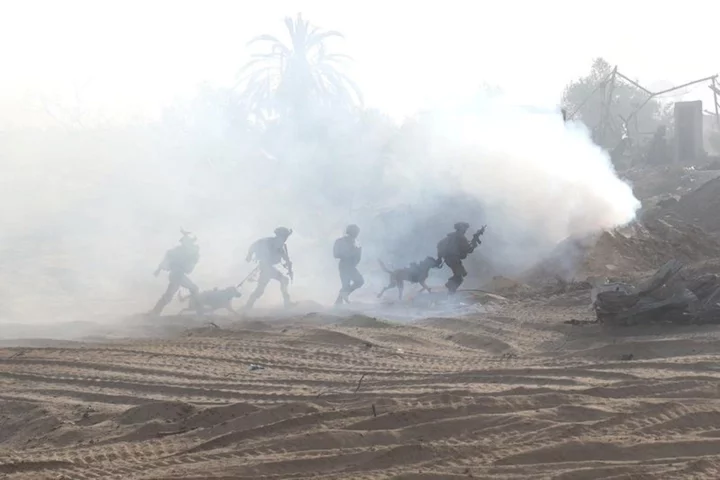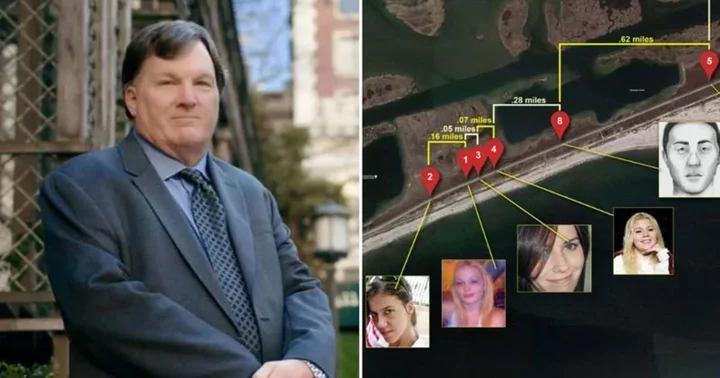President Volodymyr Zelensky secured more arms, munitions and "unwavering" diplomatic support from allies at a G7 summit in Japan Sunday, as Ukrainian forces suffered a significant battlefield setback.
After two days of talks in Hiroshima -- a city synonymous with the horrors of nuclear war -- Zelensky won a commitment from the United States for yet more "ammunition, artillery, armoured vehicles" on top of long-sought access to F-16 jets.
But the military boost came as Russia claimed to have taken control of Bakhmut, the scene of months of fierce fighting that has all but razed the city.
Zelensky acknowledged Moscow's troops were inside the city but insisted it was "not occupied".
After laying flowers at a memorial to victims of the 1945 atomic bomb attack on Hiroshima, Zelensky tearfully compared the carnage of 78 years ago to the carnage of Ukraine today.
"The photos of Hiroshima remind me of Bakhmut. There is absolutely nothing alive, all the buildings are destroyed," Zelensky said.
"Absolute total destruction. There is nothing, there are no people."
But he vowed that, like Hiroshima, Ukraine would recover.
For their part, US President Joe Biden and other G7 leaders signalled they were under no illusions that Russia's 15-month-old invasion would end quickly, vowing to support Ukraine as long as it takes.
"Will not waver, Putin will not break our resolve as he thought he could," Biden said.
The White House earlier unveiled a $375 million package of US aid that includes ammunition for HIMAR rocket launchers, artillery shells, anti-tank guided missiles and thermal imaging systems.
This, just days after the United States lifted a veto on Ukrainian access to advanced US-made F-16 fighter jets, was a significant upgrade from Kyiv's Cold War-era fleet for MiGs and Sukhois.
- Diplomatic offensive -
Zelensky's unannounced trip to Japan has been a major diplomatic coup, putting his country and Russia's invasion firmly at the top of the agenda.
Japanese Prime Minister Fumio Kishida said the invitation had been a "deeply meaningful" symbol of support.
"By inviting President Zelensky to Japan, we demonstrated the unwavering solidarity of G7 with Ukraine," he said.
Zelensky secured firm backing for key elements of his 10-point peace plan, centred on the need for a Russian withdrawal.
German Chancellor Olaf Scholz said the message from Ukraine and its allies was clear: "Russia must withdraw troops".
Any peace plan, he said, "can't simply be linked to a freeze of the conflict".
"Russia should not bet that if it holds out long enough, it will end up weakening support for Ukraine."
As well as securing diplomatic backing from allies, the visit afforded Zelensky a rare opportunity to win over a handful of nations who have pointedly offered little or no condemnation of Russia's invasion.
Leaders from India, Brazil, Vietnam and Indonesia were among those invited to attend the summit as non-members.
After a one-on-one meeting, India's Prime Minister Narendra Modi told Zelensky: "I understand your pain and the pain of Ukrainian citizens very well."
"I can assure you that to resolve this India and, me personally, will do whatever we can do."
African Union chair and Comoros President Azali Assoumani told AFP that Zelensky's meeting with G7 leaders and other invited countries had become "emotional" when the Ukrainian president recalled his country's travails.
"We condemned the war, we supported Zelensky, and I personally and sincerely saluted his courage," he said.
But there was one rumple in Zelensky's diplomatic charm offensive.
Brazil's President Luiz Inacio Lula da Silva, who has accused the West of "encouraging the war", did not meet his Ukrainian counterpart.
While Lula condemned the "violation of Ukraine's territorial integrity" and called for dialogue in group discussions, he also took a swipe at members of the UN Security Council, whose permanent members are Britain, China, France, Russia and the United States.
One official present described the exchange as "frank".
"Permanent members continue the long tradition of waging unauthorised wars, whether in pursuit of territorial expansion or in pursuit of regime change," a seeming reference to the US-led Iraq War.
Zelensky said scheduling conflicts had prevented the pair from meeting.
Asked if he was disappointed to miss talks with Lula, he replied: "I think he is disappointed."
bur-arb/sah/pbt

